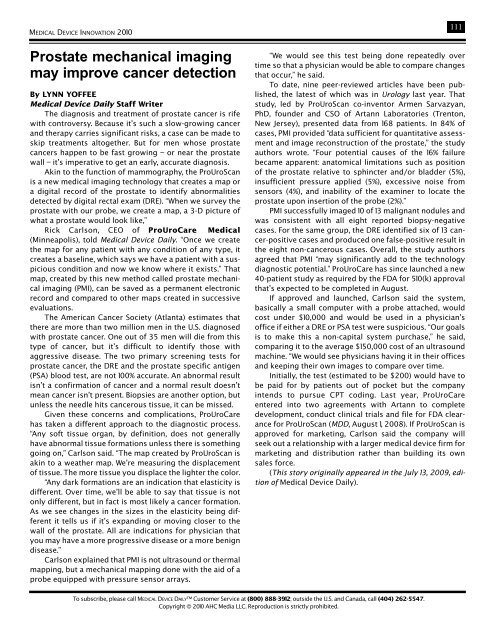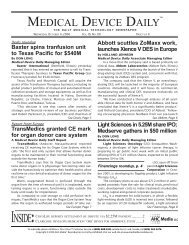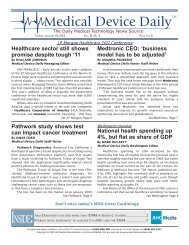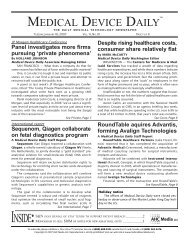MEDICAL DEVICE INNOVATION - Medical Device Daily
MEDICAL DEVICE INNOVATION - Medical Device Daily
MEDICAL DEVICE INNOVATION - Medical Device Daily
Create successful ePaper yourself
Turn your PDF publications into a flip-book with our unique Google optimized e-Paper software.
<strong>MEDICAL</strong> <strong>DEVICE</strong> <strong>INNOVATION</strong> 2010<br />
Prostate mechanical imaging<br />
may improve cancer detection<br />
By LYNN YOFFEE<br />
<strong>Medical</strong> <strong>Device</strong> <strong>Daily</strong> Staff Writer<br />
The diagnosis and treatment of prostate cancer is rife<br />
with controversy. Because it’s such a slow-growing cancer<br />
and therapy carries significant risks, a case can be made to<br />
skip treatments altogether. But for men whose prostate<br />
cancers happen to be fast growing – or near the prostate<br />
wall – it’s imperative to get an early, accurate diagnosis.<br />
Akin to the function of mammography, the ProUroScan<br />
is a new medical imaging technology that creates a map or<br />
a digital record of the prostate to identify abnormalities<br />
detected by digital rectal exam (DRE). “When we survey the<br />
prostate with our probe, we create a map, a 3-D picture of<br />
what a prostate would look like,”<br />
Rick Carlson, CEO of ProUroCare <strong>Medical</strong><br />
(Minneapolis), told <strong>Medical</strong> <strong>Device</strong> <strong>Daily</strong>. “Once we create<br />
the map for any patient with any condition of any type, it<br />
creates a baseline, which says we have a patient with a suspicious<br />
condition and now we know where it exists.” That<br />
map, created by this new method called prostate mechanical<br />
imaging (PMI), can be saved as a permanent electronic<br />
record and compared to other maps created in successive<br />
evaluations.<br />
The American Cancer Society (Atlanta) estimates that<br />
there are more than two million men in the U.S. diagnosed<br />
with prostate cancer. One out of 35 men will die from this<br />
type of cancer, but it’s difficult to identify those with<br />
aggressive disease. The two primary screening tests for<br />
prostate cancer, the DRE and the prostate specific antigen<br />
(PSA) blood test, are not 100% accurate. An abnormal result<br />
isn’t a confirmation of cancer and a normal result doesn’t<br />
mean cancer isn’t present. Biopsies are another option, but<br />
unless the needle hits cancerous tissue, it can be missed.<br />
Given these concerns and complications, ProUroCare<br />
has taken a different approach to the diagnostic process.<br />
“Any soft tissue organ, by definition, does not generally<br />
have abnormal tissue formations unless there is something<br />
going on,” Carlson said. “The map created by ProUroScan is<br />
akin to a weather map. We’re measuring the displacement<br />
of tissue. The more tissue you displace the lighter the color.<br />
“Any dark formations are an indication that elasticity is<br />
different. Over time, we’ll be able to say that tissue is not<br />
only different, but in fact is most likely a cancer formation.<br />
As we see changes in the sizes in the elasticity being different<br />
it tells us if it’s expanding or moving closer to the<br />
wall of the prostate. All are indications for physician that<br />
you may have a more progressive disease or a more benign<br />
disease.”<br />
Carlson explained that PMI is not ultrasound or thermal<br />
mapping, but a mechanical mapping done with the aid of a<br />
probe equipped with pressure sensor arrays.<br />
111<br />
“We would see this test being done repeatedly over<br />
time so that a physician would be able to compare changes<br />
that occur,” he said.<br />
To date, nine peer-reviewed articles have been published,<br />
the latest of which was in Urology last year. That<br />
study, led by ProUroScan co-inventor Armen Sarvazyan,<br />
PhD, founder and CSO of Artann Laboratories (Trenton,<br />
New Jersey), presented data from 168 patients. In 84% of<br />
cases, PMI provided “data sufficient for quantitative assessment<br />
and image reconstruction of the prostate,” the study<br />
authors wrote. “Four potential causes of the 16% failure<br />
became apparent: anatomical limitations such as position<br />
of the prostate relative to sphincter and/or bladder (5%),<br />
insufficient pressure applied (5%), excessive noise from<br />
sensors (4%), and inability of the examiner to locate the<br />
prostate upon insertion of the probe (2%).”<br />
PMI successfully imaged 10 of 13 malignant nodules and<br />
was consistent with all eight reported biopsy-negative<br />
cases. For the same group, the DRE identified six of 13 cancer-positive<br />
cases and produced one false-positive result in<br />
the eight non-cancerous cases. Overall, the study authors<br />
agreed that PMI “may significantly add to the technology<br />
diagnostic potential.” ProUroCare has since launched a new<br />
40-patient study as required by the FDA for 510(k) approval<br />
that’s expected to be completed in August.<br />
If approved and launched, Carlson said the system,<br />
basically a small computer with a probe attached, would<br />
cost under $10,000 and would be used in a physician’s<br />
office if either a DRE or PSA test were suspicious. “Our goals<br />
is to make this a non-capital system purchase,” he said,<br />
comparing it to the average $150,000 cost of an ultrasound<br />
machine. “We would see physicians having it in their offices<br />
and keeping their own images to compare over time.<br />
Initially, the test (estimated to be $200) would have to<br />
be paid for by patients out of pocket but the company<br />
intends to pursue CPT coding. Last year, ProUroCare<br />
entered into two agreements with Artann to complete<br />
development, conduct clinical trials and file for FDA clearance<br />
for ProUroScan (MDD, August 1, 2008). If ProUroScan is<br />
approved for marketing, Carlson said the company will<br />
seek out a relationship with a larger medical device firm for<br />
marketing and distribution rather than building its own<br />
sales force.<br />
(This story originally appeared in the July 13, 2009, edition<br />
of <strong>Medical</strong> <strong>Device</strong> <strong>Daily</strong>).<br />
To subscribe, please call <strong>MEDICAL</strong> <strong>DEVICE</strong> DAILY Customer Service at (800) 888-3912; outside the U.S. and Canada, call (404) 262-5547.<br />
Copyright © 2010 AHC Media LLC. Reproduction is strictly prohibited.
















